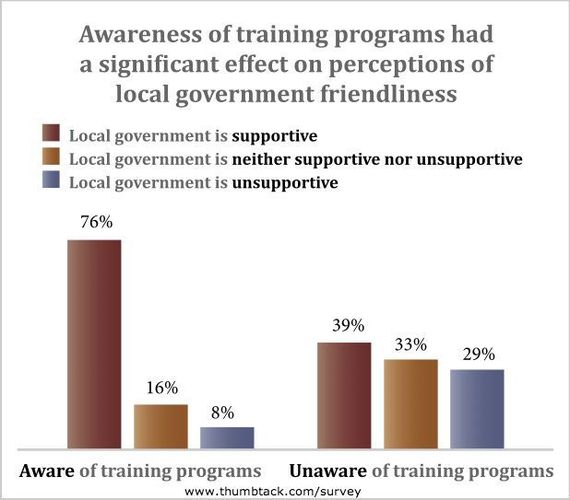We've covered what small businesses could do without from their governments, namely onerous regulatory and tax burdens, but let's discuss what they could use. Thumbtack -- a consumer service that links individuals to business professionals who can help them accomplish personal projects -- surveyed thousands of American small business service professionals, like plumbers and photographers, and found that they often rely on support from their local and state governments. Here's what we learned from the 2014 Small Business Friendliness Survey.
Small Businesses Want Government Support
A refrain you'll often hear from lawmakers is that government just needs to "get out of the way" for small businesses to thrive. There's undoubtedly some truth to this -- freeing small business owners from regulatory burdens so they have more time to build their business and concentrate on their customers often makes owners happier.
But being upset about regulatory or tax burdens doesn't mean small businesses want their governments to disappear. According to our survey, small businesses value training and support offered by their local governments, and they want and need their local governments to get the word out about those programs.
What makes these programs effective? SCORE offers a good example. Small businesses are often mystified by opaque tax and licensing requirements -- resources like SCORE can guide them through the process. Networking events are well received too. Small business professionals are usually independent operators who rarely have the opportunity or free time to meet and talk shop with others in the same field. Networking events solve this problem for busy pros.
Professionals who were aware of support programs ranked their governments as 10 percent more friendly than those who were not. Indeed, efforts to publicize training, networking, and other support programs was the most significant factor directly under a government's control in determining our overall friendliness grade.
This makes sense if you consider that 57 percent of survey respondents said they had never before run their own business. Starting your own business can be daunting, but a counselor in Austin made the point clear: "The city has really solid small business trainings, and [the] community college has a great program to walk you through business fundamentals." These programs -- whether funded exclusively by government or in partnership with local institutions -- make a huge difference in the comfort level, and success rate, for first time business owners.
So, what are the lessons for policymakers?
- Streamline the rules for starting a business. Move this process online as much as possible and make this process affordable -- in price and in time. Business owners want to pour what capital and working hours they have into the growth of their business, not feel like their wasting time and dollars on fees and frivolous forms.
- Make sure the tax rules are simple to understand and comply with even without the assistance of a professional accountant. Many small businesses just don't have the cash to pay out for expensive accounting services.
- Publicize what assistance is available from the city or state to business owners just getting started.
- Consistently enforce the rules that are on the books, especially those related to the operation of unlicensed businesses.
- Establish reciprocity for licenses with surrounding communities -- a plumber should be able to use the same license for identical jobs that happen to be on different sides of the county line.
- Make sure that the necessary licenses and permits to work in the area are simple to obtain and only as burdensome as necessary to protect the public. Making service professionals wait days at City Hall to pull a permit for a plumbing job when they could be working slows everyone down.
The takeaway is that good government shouldn't be a vanishing act. Small businesses count on their public servants to provide a helpful service. Just as a plumber wouldn't leave a customer with a leaky pipe, policymakers shouldn't leave small businesses with problems they now know how to fix.

